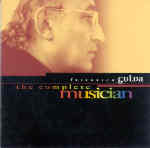The Complete Musician originally was a 5-LP set issued in 1978, culled from recordings made in Friedrich Gulda’s private home studio. The pianist would enter the room and simply play whatever the mood dictated: Bach, Beethoven, Schubert, Ravel, his own compositions, or perhaps some jazz. Later he’d overdub flute lines along with pre-recorded clavichord tracks for Bach, or a rhythm section for Dizzy Gillespie and Cole Porter. The piano is miked at the extremely close range we associate with the pianist’s second Beethoven sonata cycle for Amadeo or the solo-piano recordings Oscar Peterson made for MPS in the late 1960s. As a result, the sound conveys the intimacy of a private salon. Presumably this was Gulda’s intention.
Under such a sonic microscope, however, Gulda’s expansive Ravel (Gaspard de la Nuit) and Debussy (Reflets dans l’eau and La fille aux cheveux de lin) sound dry and two-dimensional next to his masterful, atmospheric 1950s recordings of these same composers. His transcription of Schubert’s Der Wanderer often stretches the vocal line past its breaking point, while the insistent accompanying triplets pound as they grow louder. The freedom and flexibility Gulda brings to Schubert’s A minor D. 845 sonata, however, is imaginatively proportioned and moves the music urgently forward. Here the dry ambience creates a coiled, analytic patina that works to the advantage of Gulda’s conception, revealing just how extraordinarily well he controls Schubert’s unwieldy keyboard writing. Much the same holds true in Beethoven’s Op. 110 sonata, a long-time Gulda specialty.
Gulda concocts a nearly 20-minute Johann Strauss rhapsody that could have made its point in three minutes. Yet once Albert Golowin’s raspy voice enters just before the end (he sounds like Tom Waits and Marlene Dietrich morphed), the music ends on a wistful, touching note. Bach’s Well-Tempered Clavier Book 2 E major Prelude and Fugue flow with lyric simplicity, as do the A minor Book 2 and C major Book 1 selections played on the clavichord. Gulda’s zesty romp through Bach’s Chromatic Fantasy and Fugue is a delight, and you can tell how much he enjoys the clavichord’s vibrato capabilities.
Gulda remains at the clavichord for an original jazz composition, For Rico (dedicated to his pianist son). Its middle-section ostinato provides a springboard for inventive improvisation, where Gulda takes tasteful advantage of the clavichord’s note-bending capacity. The Bach F major sonata and a handful of jazz standards display Gulda’s accomplished though not tonally distinct flute playing. In all, this is a good and often memorable overview of Gulda’s multi-faceted talents.
































